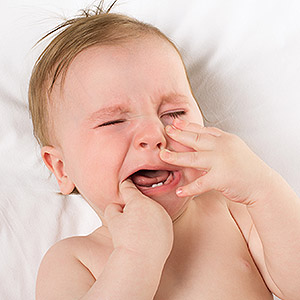
Parents will do just about anything to relieve their children’s discomfort when they’re in pain. When a toddler is suffering through a teething episode, it’s tempting to turn to a topical numbing ointment to soothe their gums.
But there can be a hidden danger for kids if you use certain over-the-counter products used by adults for gum or teeth pain. Many of these topical ointments contain a pain reliever called benzocaine. While it’s relatively safe for adults, benzocaine can be hazardous for infants and young children.
Studies have found that benzocaine contributes to a disease called methemoglobinemia, in which a protein in the blood called methemoglobin increases to abnormal levels. Too much of this protein inhibits the transport of oxygen throughout the body. For young children, this can cause shortness of breath, fatigue and dizziness. In extreme cases, it could lead to seizures, coma or even death.
Parents are urged to avoid using any product containing benzocaine to ease gum or teething pain in children. Instead, the American Academy of Pediatric Dentistry recommends providing a child a chilled (not frozen) teething ring, pacifier or a damp clean cloth to chew on. The chewing action helps relieve gum swelling pressure and the cold will help numb the pain. Massaging the gums with a clean finger may also help.
If the pain persists, parents should consult a doctor or pharmacist about giving their child pain medication. Drugs like ibuprofen or acetaminophen (never aspirin) administered in the proper dosage for a child’s age can help ease teething discomfort. Medications should always be given orally—you should never rub substances like aspirin or alcohol directly on the gums, which can further irritate already inflamed tissues.
Teething episodes come and go during a child’s early dental development—they are like storms that swell and abate before they finally pass. Except when accompanied by fever or diarrhea, there’s no need for concern. Your main goal is to help ease their discomfort as much—and as safely—as possible.
If you would like more information on how to help your child weather teething episodes, please contact us or schedule an appointment for a consultation.
